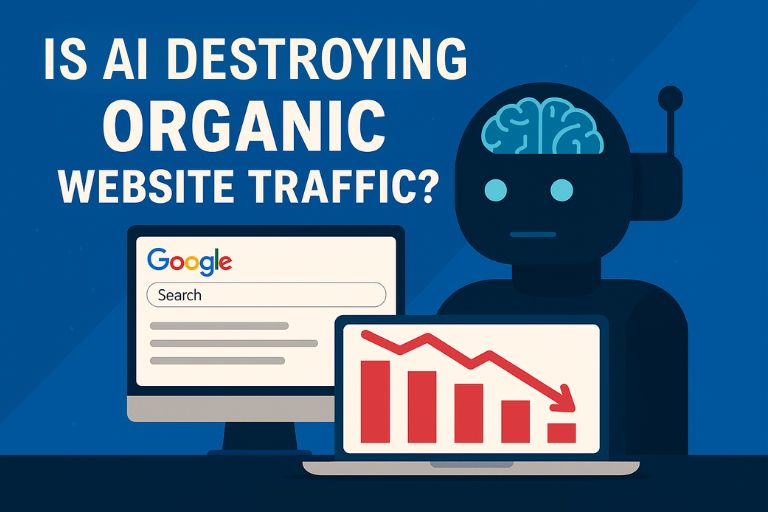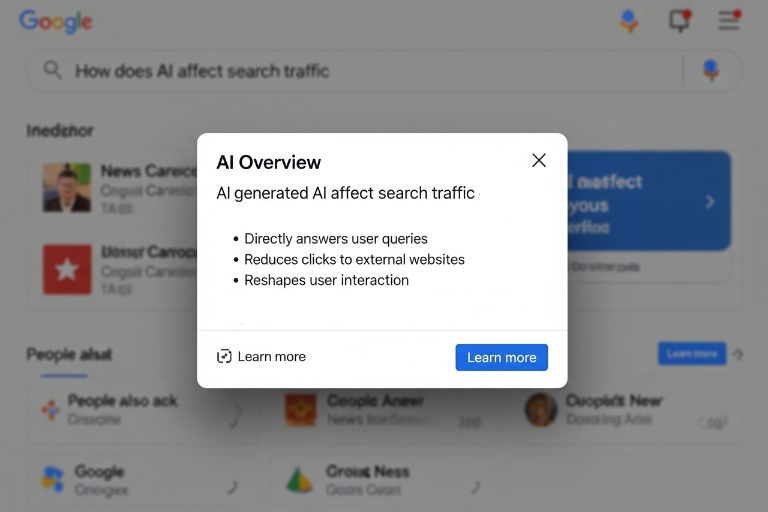
Introduction
If your website has seen a noticeable drop in organic visits lately, you’re not alone. Many businesses report double-digit declines in organic traffic from Google, directly linked to how AI is changing the way people search and how Google serves results.
How AI Is Stealing Your Clicks
Google’s introduction of AI Overviews (previously known as SGE, the Search Generative Experience) means that for many search queries, users now see detailed AI-generated answers right on the results page without ever needing to click through to a website.
This is part of Google’s push to keep users within its own ecosystem. Instead of showing ten blue links and encouraging users to visit external sites for more information, Google’s AI tries to summarize everything instantly. That’s convenient for the user but devastating for publishers, bloggers, and e-commerce sites that depend on organic traffic.
The Hard Numbers: Organic Traffic Declines
Recent industry studies and countless anecdotal reports reveal the scope of the problem. Some publishers are seeing 20 to 40 percent drops in organic traffic year over year, especially on informational content that AI can easily summarize. Click-through rates for top positions on the search results page have also declined as fewer people bother to visit sites after reading the AI snippet. Even branded queries, where people might search specifically for your site, are sometimes intercepted by Google’s AI boxes or competing “People Also Ask” panels.
In short, you’re losing visitors before they even see your carefully crafted content.

Why This Should Alarm Every Business With a Website
This isn’t just a problem for bloggers or media outlets. If your business relies on organic search to generate leads, drive affiliate sales, or build brand awareness, AI summaries in search results are siphoning off your potential customers.
The biggest risks are clear. You lose brand connection because users get their answers from Google, not you, and may never know your brand exists. You lose conversions because if users don’t click through, they don’t sign up, buy, or subscribe. And you lose data, since no traffic means fewer behavioral insights, smaller retargeting audiences, and less first-party data collection.
What Can You Do About It?
You can’t stop Google from rolling out AI, but you can adapt. Focus on brand building so people seek you out directly. Email lists, communities, and social channels are more critical than ever. Create content that goes deeper than simple answers. If your content is only surface-level, Google’s AI can easily replace it. In-depth analyses, original data, or strong opinions are much harder to replicate.
It’s also smart to optimize for visibility within AI answers. Using structured data, providing clear answers, and signaling authority may help your content get cited in AI overviews, even if it doesn’t always result in a direct click. Most importantly, diversify your traffic sources. Paid campaigns, social media, and partnerships ensure you’re not relying solely on organic search.

The Bottom Line
AI isn’t just changing search; it’s rewriting the rules of how people discover and engage with your brand online. Ignoring this shift is risky. Now is the time to rethink your content strategy, marketing mix, and how you build lasting relationships with your audience, before Google’s AI takes even more of your organic reach off the table.
